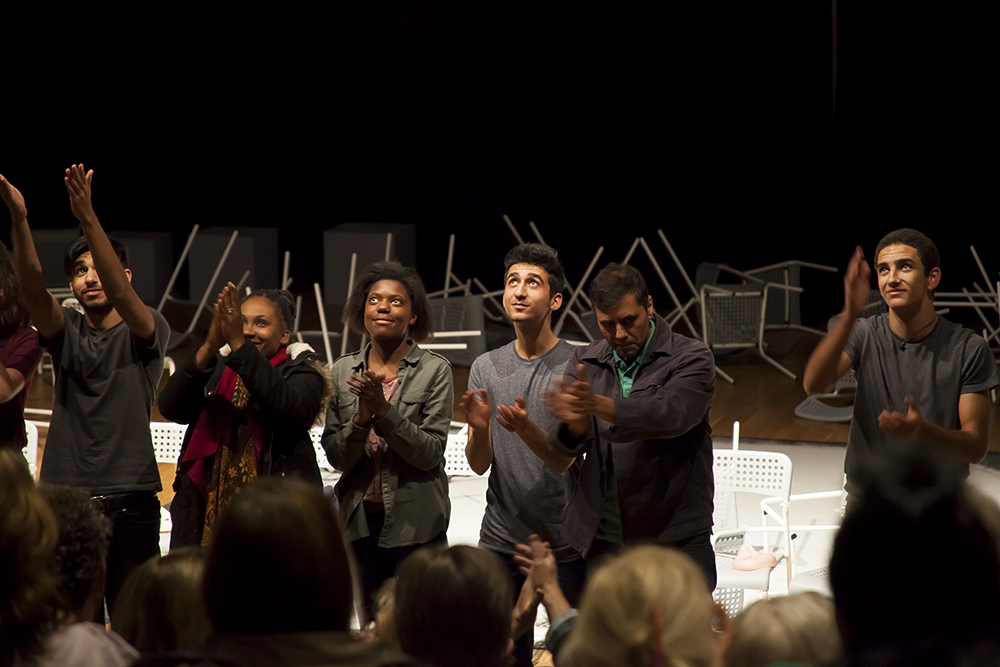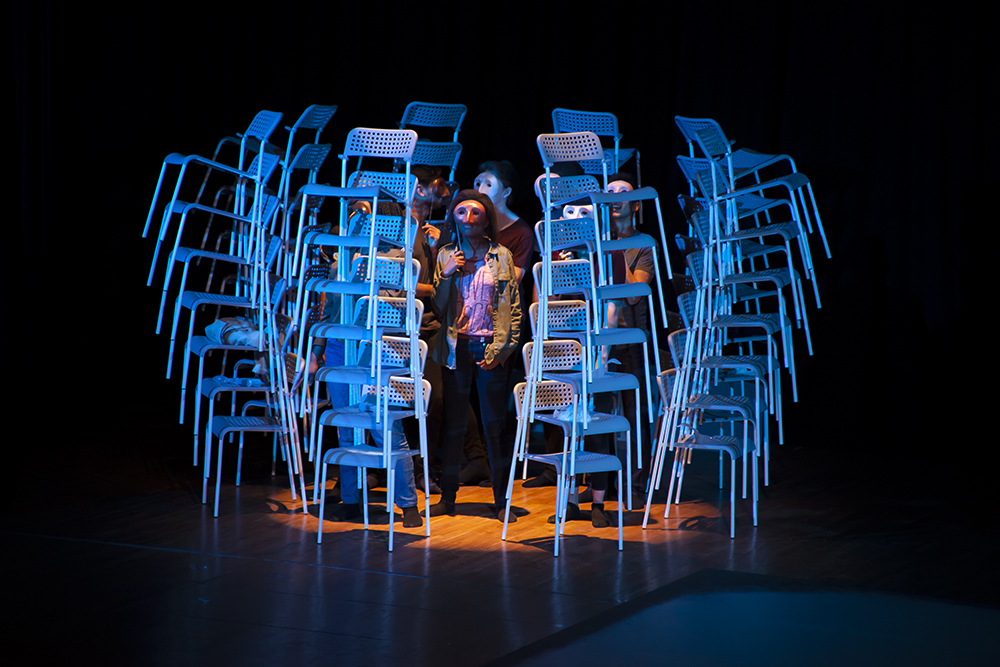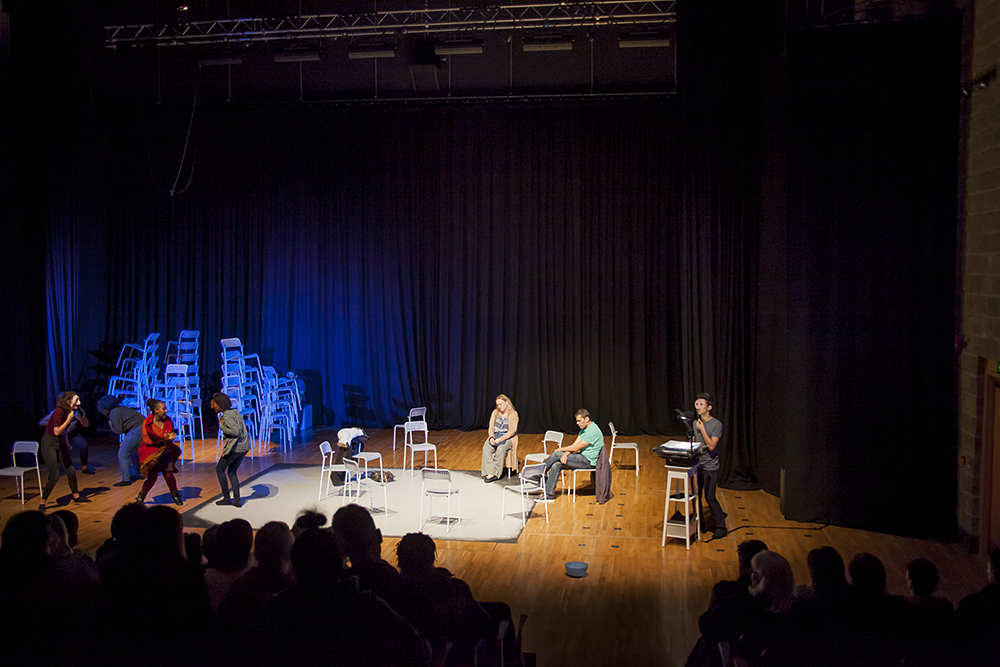Written by Claudette Bryanton
A new play by Alexandra Johnson, produced by STAMP Productions CIC
What happens when two people in the creative arts get together who happen to have shared goals, some shared life experiences and a desire to tell unknown or rarely heard stories? The answer is a passion to share this story to the wider community, and to tell their stories back to their originators, for validation and to demonstrate understanding, which reflects how much the experience of the carers and cared for who inform this work matter. We plan to share the story of care, to give fresh insights to this story, which is probably one of the most important stories to be told, that of human altruism.
Why this play?
Last year 2023, Alex asked me if I would be interested in mentoring her through her ideas about creating stories about carers, their experiences of care, specifically unpaid carers at home. She had a strong desire to tell a story about familial care.
Well over 5 million of us in the UK are unpaid carers; with countless more who don’t see themselves as carers… but are. These ‘hidden carers’ are restricted by their care responsibilities, sometimes unable to work or socialise, because someone needs them at home.
It’s hard to tell a story about what is happening ‘inside‘ a house. This is not a grand tale, it might not seem epic, though we would argue it is. It might seem small but nonetheless it is often heroic and sometimes though rarely, abusive. It is all those things that are about being human. Perhaps the first story of care is the discovery of a 15,000-year-old human thigh bone with a healed fracture. It would take at least six weeks or more for that bone to heal, others would have cared for fed and protected that person. Care is perhaps the first sign of civilisation and the lack of it the opposite.
Inside is about care but it is not entirely heroic, selfless and serene. Far from it, it is often turbulent dramatic and performed by unexpected people.
What is INSIDE about?
Alex had already fixed on her key characters, a mother and adult son. The son, a drag artist, had undergone a terrible experience being badly beaten after one of his gigs. He has PTSD and is suffering from agoraphobia. He hasn’t left his house for many years. This suited him well in a perverse way as his mother was succumbing to dementia, probably Alzheimer’s. Their lives were dramatically changing, son, Ray, from being looked after, living at home with his aging mother to reversing roles and becoming her carer. His mother is Coventry Irish, having moved to the city in her youth. Mother has cooked her son’s meals, washed his clothes, done his shopping and in her dreams, married him off with a bevy of grandchildren, it didn’t happen and now their roles are being slowly reversed. It is a story of loss, loss of identity and half-lives, lived at home inside, and inside their heads.
We meet Ray, the son, as this cataclysmic reversal has happened, though it’s legacy shadows their current selves. Into this closed environment several times a day enter professional carers. Carers who get Mother up toileted and washed, give her breakfast and sit her in her chair for the day. They visit again at lunchtime and then at the end of the afternoon to get her undressed, change her continence pads and put her to bed. These carers bring both welcome and unwelcome disruption to their lives. The carers mostly from the African continent as part of the new government scheme to recruit enough carers. They are from Nigeria and Ghana, Uganda, Kenya, also Zimbabwe and South Africa, over half of British care workers come from other countries where unemployment is high and opportunities for work and education poor. Angel is from Nigeria. He is just one of many strangers coming into their lives and his story is a revelation. Prejudices and assumptions are confounded, by the attitudes of those trapped inside.
Of course, Mother has seen people different to her all her life, but she has yet to welcome them right into her home. As for Ray, he is discombobulated by every visit.
Not unsurprisingly mother resented having this big lump of a son cluttering up her house with his dresses and outlandish wigs, but he paid towards the rent and did a few useful jobs around the place when pushed. She couldn’t get her head around his desire to wear woman’s clothing but put it down to being the only way he could earn a living. She was a fan of Danny La Rue. Ray kept his sexual orientation to himself as far as his mother was concerned. She had long since stopped trying to understand why Ray didn’t work on the track at Banner lane alongside all the other men, many from the Irish community just like her, but many also from South Asia and the West Indies. That is why they had left their beloved Ireland to come here, in fact why everyone had left home to come here. The streets of Coventry were then paved with gold.
The play examines familial and professional care giving exploring the blurred boundaries between duty and love. The use of documentary fiction (docu-fiction) will enable the play to examine the complexities of care whilst telling a powerful story from Coventry which has been and still is the destination for many different ethnic communities from the end of WW2 to today. The narrative explores the isolation of a once forceful and resourceful woman in a Coventry Irish family who has dementia, with the son, Ray, who still lives with her. Mother’s dementia and Ray’s mental health serve as metaphors of their trapped isolation. Both characters struggle with loss of identity and the play explores whether it is possible to reclaim a sense of self after everything is stripped away. Into this trapped inside world, the morning and evening carers, arrive with compassion, cultural difference, pragmatism and brusque efficiency. They share their worlds, hopes and dreams of the future and force Ray to confront his fears.
What have we done so far?
I met Alexandra Johnson, to discuss her ideas, a local writer of both theatre and film scripts. We knew each other and had co-produced small projects in the past. In 2023 Alex had been awarded funding by the Coventry City of Culture for professional mentoring. She invited me to be her mentor. We had an exciting 6 months discussing and exploring the potential of a play about care. We met carers, Alex wrote some script, and we read and researched some of the elements that would make a play. Alex produced a short script for a scratch night at The Pleasance still pictures and it was clear from the positive outcome that this was an idea that could be worked into production. Alex approached the Belgrade Theatre, and they were enthusiastic to support us.
We explored the interesting relevance of the son drag artist and how he can satirise the position he is in and comment on society in an accessible and entertaining way. Contemporary drag allows for a broad explorations of gender expression and activism which gives both characters a voice in unexpected ways.
We have learnt from observing good practices in the care community that people with dementia respond particularly well to fun lively drama sessions, singing and vivid costuming. Music, performance and familiar aesthetics can evoke memories and recognition. Ray reaches his mother through his drag persona bringing some laughter and colour into their lives albeit that the moments of engagement we know are brief. So, what happens when Mother goes missing?
Alex developed some of these ideas in script which I directed, and we took to The Pleasance Theatre London scratch night and explored in a care home with an interactive drama session. Our discussions and opportunities to share some of our ideas, suggested we had a story, to be told and a play to be produced. The Belgrade theatre Coventry is interested to support this production, and we met with the creative director Corey Campbel who would like to programme it into the B2 space. The Belgrade is keen to support local artists and produce new work which would be of a direct interest to the local community of Coventry and reflect their stories. Campbell already knew of Alex’s work X Co-writing “Theatre of Wandering” for Oi Bokkshi Theatre, (2022) and FAITH for the RSC (2022) as well as her short film about end of life care commissioned by Sky Arts for broadcast called ‘Widow’s Might’. This film received 3 Royal Television Society Award nominations. The Belgrade have pledged support in kind, which offers us two weeks rehearsal space and a week in the B2 space with a technician and marketing support in the brochure.
X Alex’s website and a bit about Alex’s work with Theatre of Wandering.
With our anticipated Box Office share from this production, we will be able to tour our extracts workshops and forum theatre package to local care facilities which include Care Homes and Retirements Homes. We will reach both carers and residents as carers will attend the performance with the residents thus enabling carers to see and interact with the performance. We have factored in 6 events depending on the BO receipts.
So why choose STAMP Theatre and Media Productions CIC for this project?
STAMP’S particular remit and USP is to tell untold or rarely heard stories from those who are not usually asked to tell their stories. For example, our project called Hear my Voice tells the stories of 6 Black Caribbean older woman migrants and 6 South Asian older woman migrants. We foregrounded elder women’s stories as older women are invisible. Their stories of endeavour care and protection of their children and communities is remarkable, and we were proud to have recorded this small selection and give those contributors the space needed to tell their stories. All our work has as its centre the stories of those least able to find a voice and Inside chimes perfectly with this ethos.
Further our work is specifically drawn from research and interviews of lived experience, our plays are drawn from verbatim text, Passing On and Dictation. Alex wanted to explore this methodology further to inform her work. We at STAMP believe that the authenticity of theatre drawn from research interviews resonates deeply with audiences and that the human connection of live theatre, the dynamic interaction between actors and audience combines in a unique immersive experience.
STAMP develops research-based theatre. We work with academic researchers, to elicit unheard voices, migrations stories, stories of those who are vulnerable such as those with genetic conditions IDNA film. Young people experiencing mental health illness and their families. Some examples of Cracked:



Alex’s play will be informed by research interviews and interactive workshops with carers and those they care for, to capture their lived experiences which will be led by STAMP.
Most importantly we will also have an advisory group comprising care users, carers of paid and unpaid care work and men from the Irish Society and drag performers. We have introduced ourselves and approached and worked with care facilities in the lead up to this application assessing the viability of this project learning from carers and residents some of the key issues that are of concern.
We have considerable experience working with a project on end-of-life care Passing On of dealing with sensitive issues and working with extremely vulnerable people.



- Our workshops with care homes and care staff inform our story. Images of us at Avalon court
- Our consultations with male carers from the Irish community.
- Pressures on carers particularly those caring at home for relatives. Interview comments from Amy Asford
- We will perform key excerpts of the play to care homes in the West Midlands using forum theatre interview extracts from Kay Stone
- Meeting with Nick Cherryman. Ref to his work and Ibi Profane
Inside on Tour
The touring element of our project is focused on performances in care facilities that will be interactive, giving space for the voices of the carers and residents. Our carers will be invited to explore solutions with our actors, writer and director and foster dialogue. STAMP will create a safe space and supportive setting to engage both carers and residents. Audiences will be invited to participate in various degrees without the full-scale co-creation that characterises Forum Theatre.
We were invited to present a workshop to trial these ideas and Activities co-ordinator is very keen to invite us to take this work further.
Include bits of the interview with Kay sent by Ross.
The play Inside at The Belgrade will reach out to both to theatre and non-theatre audiences using lived experience from a wide range of participants to inform the narrative. Although the issues are difficult and complex, moments of hope and humour offer opportunities that enable us to engage with the complexities of this inside world. It offers a deeper understanding of those who are at the margins of society and whose status needs to be recognised as vital and important. Email invitation to perform at The Belgrade.